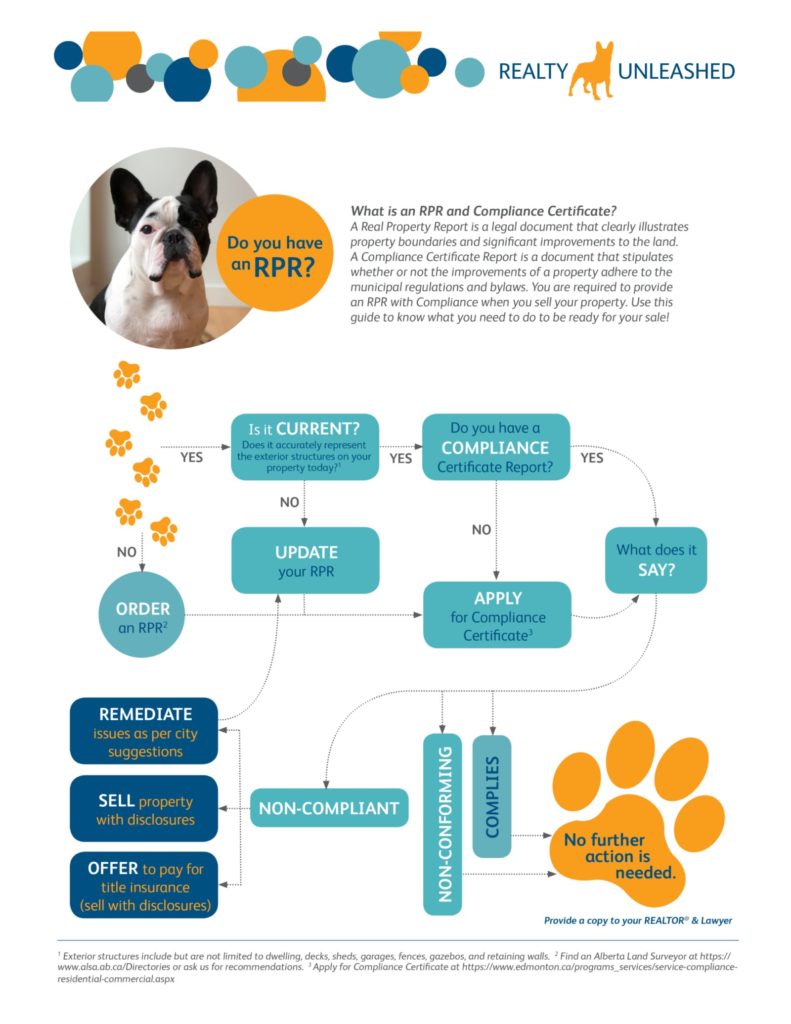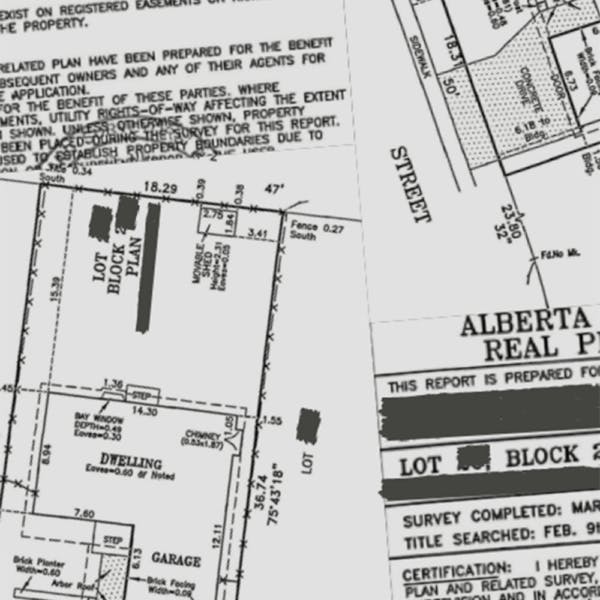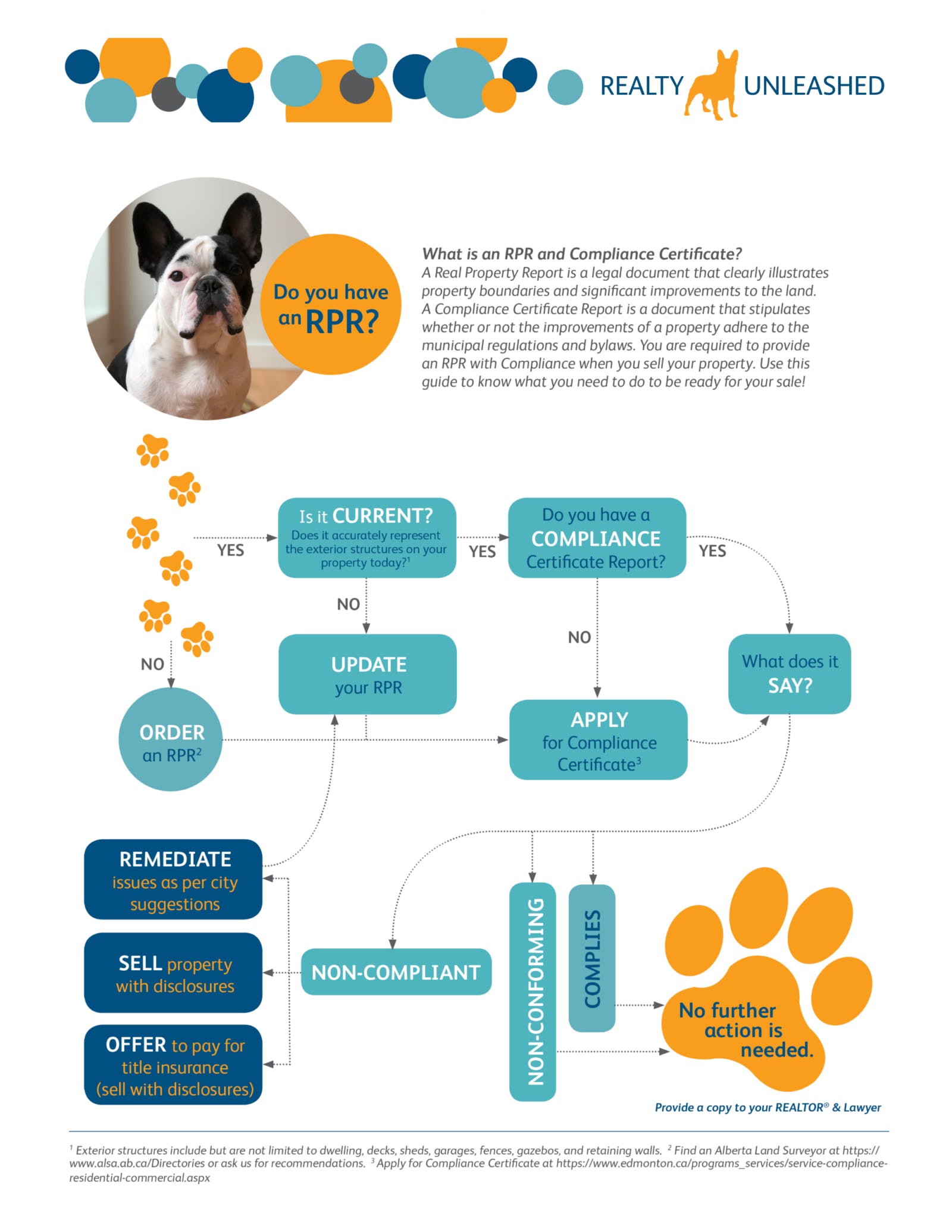A Cautionary Tale
A few years and dozens of transactions ago, we represented a buyer purchasing a property. The seller of the property had an unpermitted deck, did not have an updated Real Property Report (RPR, an illustration of the property), nor a Compliance Certificate from the city. None of these items were disclosed to the buyer.
When it came time to close, these three details were discovered. $20,000 of sale proceeds were held by the buyer’s lawyer to ensure that the three items were remedied. Effectively the seller received $20,000 less than the agreed-upon sale price. And while our buyer was pleased with the discount, she will ultimately need to get a permit, make sure it meets requirements, update the RPR, and apply for compliance when it’s time to sell the property in the future.
For the buyer, this was stressful and inconvenient. For the seller, I imagine, this was a nightmare.

What is a Real Property Report + Compliance?
If you are selling a property, issues arising from RPR and Compliance can range from $1,000 to the tens of thousands. In order to understand how to avoid a mistake like this, it is important to understand what they are.
Real Property Report
A Real Property Report (RPR) is a legal document with the purpose of clarifying the area of noticeable improvements related to property boundaries. This report illustrates the significant improvements to a property, and also includes a written portion that explains the surveyor’s opinions or concerns. A current RPR means that the drawing accurately reflects the current existing structures on the property. For example, if you have an RPR from the time of purchase and you have since built a deck, the RPR would not be current and should be updated.
The standard Residential Purchase Contract in the province of Alberta requires that a current RPR is delivered at the time of closing. Your real estate professional can assist you by reviewing your RPR to help you determine if it needs updating. They’ll make recommendations regarding any disclosures that should be made to a potential buyer, in order to ensure your protection. As always, we strongly recommend your legal professional review a sample purchase contract. The contract will contain any disclosure that needs to be included or strikes any terms that should be omitted.
To give yourself clarity in making appropriate disclosures for parties to agree on, having a current RPR is optimal. This, along with your compliance certificate will also help you to avoid costly surprises at the time of closing.
Cost of an RPR
The cost of an RPR can vary depending on the location of the property, report requirements, and complexity of the drawing. According to the Alberta Land Surveyors’ Association, there are a number of elements that can impact costs, these include:
- Availability of the survey evidence defining boundaries
- Current and historical title searches
- Other surveys in the area under consideration
- An Alberta Land Surveyor’s experience and resources available at the time of the project
- Travel and accommodation costs
- Application, endorsement, approval or record searching fees
Depending on your service provider, property location, report requirements, and complexity of the drawing, an RPR can cost between $600-$900.

Timing
Depending on the workflow of a given service provider, a Real Property Report can take 5-10 business days. If you are considering selling your home and your RPR needs to be updated, this is something you should get started on right away. If you are unsure whether you need to update your RPR, talk to your REALTOR®!
Should you be interested in obtaining an RPR, you can visit this link to find a list of Surveying companies that can help you.
Compliance Certificate
A Compliance Certificate is a report from the City of Edmonton that verifies whether the structures on your property meets the regulations under the Zoning Bylaw. It also confirms if the appropriate development permits have been obtained for any structures that are drawn on the report.
A Compliance Certificate is applied for through the city of Edmonton and can take about 7 business days to process. Many surveyors, for a small premium, can make this application on your behalf.
The Certificate gives you clarity on whether or not there are aspects of municipal compliance that need to be disclosed and accepted by a prospective party. This clarity also provides a prospective buyer with peace of mind that a property that they are interested purchasing has been okayed by the City.
A Compliance Certificate costs about $150 with regular service and can be applied for here.
How do I prevent losing money because of RPR + Compliance Issue?
The Residential Purchase Contract used for Real Estate transactions in Alberta specifies, among other things, that the seller will provide a current Real Property Report, and that the property complies with municipal bylaws. In a perfect world, everyone who seeks to sell their property has already acquired the appropriate permits to add or change significant structures on their property. They also would ideally have a current RPR and have received confirmation via a Compliance Certificate from the city that confirms compliance with municipal bylaws.
To get around the time, cost, and hassle of RPR with Compliance, many sellers will offer Title Insurance instead. It costs the seller less money and offers some level of protection for the future owner should there be defects associated with the property. However, offering Title Insurance is yet another opportunity for sellers to lose money!
It creates doubt in a buyer’s mind about whether or not a property has a compliance issue that they may have to address in the future. If this is the case, it can lead to a perception that can discount the value of your property. This option can be utilized if you don’t have the funds or the time to order an RPR and Compliance, and in cases where you are selling a property as is – where is.
The best option is to get and give certainty. Order an RPR through an Alberta Land Surveyor and apply to the city for Compliance. The results of the Compliance Certificate will clearly state whether there are any defects that should be addressed. You can address them by disclosing them and having a buyer agree, or you can remedy the issues. We have created an infographic to help you decide what the best course of action is once you receive your Compliance Certificate.

Common Issues on Compliance Certificates
Sheds
One of the most common issues that show up on a Compliance Certificate are sheds that are too close to the property line. Most buyers would prefer a shed to be out of the way and will typically agree to accept this defect on the Compliance Certificate. The key, however, is to ensure that this is disclosed and agreed upon prior to a firm sale. Failure to do so may trigger a loss upon closing when the buyer requests funds to be held back to remedy.
Decks
Another common issue, such as the one in our case study at the beginning of this article, is a deck that is built without a permit. Some decks require permits, while others do not. A current RPR will show the drawing of the deck. During the Compliance application, the city will search its records for a permit if required. They will then decide if the deck meets the city’s municipal bylaw requirements.
If the seller had gotten an RPR and applied for compliance, they would have had the knowledge to disclose to the buyer and could have had the buyer agree. This disclosure may have been less than the purchase price that was agreed upon, but it would not have been so costly for the sellers.
Pergolas and Gazebos
Pergolas and unmoveable Gazebos add beautiful ambient features to a backyard and outdoor living space. The creation of these attributes can often increase the desirability for a property. However, they often create issues for municipal compliance. Like the preference of having a shed close to the property line, many buyers are happy to accept Compliance defects because they see a benefit to having a Pergola in their yard.
However, if an RPR is not delivered upon closing, or there are defects at Compliance that have not been disclosed and agreed upon, you can expect a holdback at the lawyer, likely in the thousands of dollars.
What an RPR + Compliance Certificate does not cover
Because the Compliance Certificate assesses the adherence of structures built to municipal bylaws, the City can determine if permits were obtained for those structures. For example, if there is a new garage drawn on the RPR and there are no records of permits, the city will deem the garage non-compliant. Work that Requires Permits that does Not show up on the Drawing.
However, the Compliance process will not be able to determine if there the appropriate permits were obtained for work done inside the home. For example, if a basement was developed or a new bathroom was installed, it will not be drawn on the RPR and therefore the City cannot assess if it has the required permits.
A seller is required to disclose anything on the property lacks appropriate permits.
Work that requires permits that don’t show up on the drawing.
However, the Compliance process will not be able to determine if the appropriate permits were obtained for work done inside the home. For example, if a basement was developed or a new bathroom was installed, it will not be drawn on the RPR and therefore the city cannot assess if it has the required permits.
A seller is required to disclose anything on the property lacking appropriate permits.
Material Latent Defects
Material Latent Defects are defects to a property that are costly to fix or pose a safety hazard that are not discoverable upon reasonable inspection. For example, if you experience water entering your basement every spring or you know about cracks in the foundation that you should have covered up with drywall.
A seller is required to disclose anything on the property that is a known material latent defect.
The Last Word
Ensuring you have a current Real Property Report and Compliance Certificate is an important consideration before you list your home. Knowing about aspects of your property that are non-compliant is critical to remedy or disclose to a buyer. If you have questions about your property you should speak with your REALTOR® and your lawyer. And when in doubt, disclose. Doing so can save you thousands of dollars!











